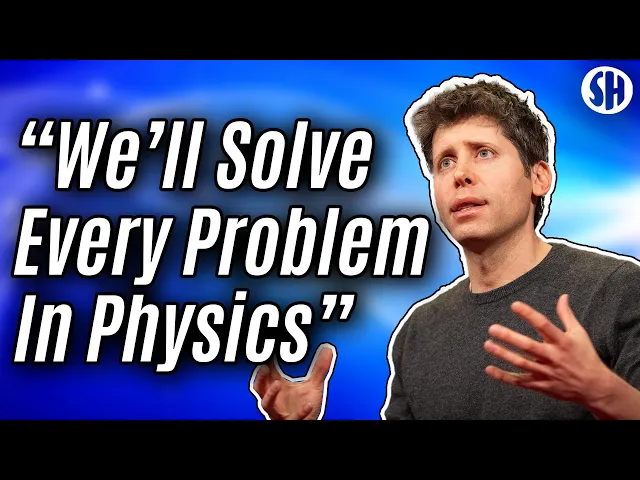Will AI Save Physics?

AI might reshape physics research — not replace it
In a time when AI tools like ChatGPT are transforming everything from content creation to customer service, physicists are asking a profound question: can artificial intelligence help solve the deepest mysteries of our universe? The recent YouTube video "Will AI Save Physics?" explores this fascinating intersection between cutting-edge AI and fundamental physics research, highlighting both the extraordinary potential and significant limitations of applying machine learning to theoretical physics.
The conversation around AI in physics represents a pivotal moment for a field that has historically relied on human intuition, mathematical rigor, and experimental validation. As physics faces increasingly complex challenges—from reconciling quantum mechanics with general relativity to understanding dark matter—AI offers new computational approaches that could potentially accelerate discovery. However, the relationship between AI and physics isn't straightforward, and the role these technologies might play remains hotly debated among scientists.
Key insights from the discussion:
-
AI excels at pattern recognition and data analysis but struggles with the kind of creative leaps and conceptual innovations that have historically driven physics breakthroughs.
-
Machine learning models have shown promise in specific physics applications like simulating quantum systems and analyzing particle collision data, but they function more as powerful calculators than as sources of new theoretical frameworks.
-
The most promising approach appears to be a collaborative human-AI partnership, where AI handles computational heavy lifting while human physicists provide conceptual guidance, interpretation, and theoretical creativity.
Why this matters now
The most compelling insight from this discussion is that AI's role in physics isn't about replacement but augmentation. This perspective cuts through the hype cycle that often surrounds AI discussions and offers a more nuanced view of how these technologies can contribute to scientific discovery.
This matters tremendously in our current scientific climate. Physics has reached several theoretical impasses—string theory hasn't delivered its promised unification, the Standard Model has gaps, and dark matter remains elusive despite decades of searching. Meanwhile, experimental physics grows increasingly expensive and complex. The Large Hadron Collider cost approximately $9 billion, and the next generation of particle accelerators will require even greater investments. In this context, AI tools that can simulate experiments, analyze vast datasets, or suggest promising research directions could help maximize returns on these massive investments.
Beyond the video: real-world applications emerging
What's particularly interesting is how AI is already
Recent Videos
How To Earn MONEY With Images (No Bullsh*t)
Smart earnings from your image collection In today's digital economy, passive income streams have become increasingly accessible to creators with various skill sets. A recent YouTube video cuts through the hype to explore legitimate ways photographers, designers, and even casual smartphone users can monetize their image collections. The strategies outlined don't rely on unrealistic promises or complicated schemes—instead, they focus on established marketplaces with proven revenue potential for image creators. Key Points Stock photography platforms like Shutterstock, Adobe Stock, and Getty Images remain viable income sources when you understand their specific requirements and optimize your submissions accordingly. Specialized marketplaces focusing...
Oct 3, 2025New SHAPE SHIFTING AI Robot Is Freaking People Out
Liquid robots will change everything In the quiet labs of Carnegie Mellon University, scientists have created something that feels plucked from science fiction—a magnetic slime robot that can transform between liquid and solid states, slipping through tight spaces before reassembling on the other side. This technology, showcased in a recent YouTube video, represents a significant leap beyond traditional robotics into a realm where machines mimic not just animal movements, but their fundamental physical properties. While the internet might be buzzing with dystopian concerns about "shape-shifting terminators," the reality offers far more promising applications that could revolutionize medicine, rescue operations, and...
Oct 3, 2025How To Do Homeless AI Tiktok Trend (Tiktok Homeless AI Tutorial)
AI homeless trend raises ethical concerns In an era where social media trends evolve faster than we can comprehend them, TikTok's "homeless AI" trend has sparked both creative engagement and serious ethical questions. The trend, which involves using AI to transform ordinary photos into images depicting homelessness, has rapidly gained traction across the platform, with creators eagerly jumping on board to showcase their digital transformations. While the technical process is relatively straightforward, the implications of digitally "becoming homeless" for entertainment deserve careful consideration. The video tutorial provides a step-by-step guide on creating these AI-generated images, explaining how users can transform...
